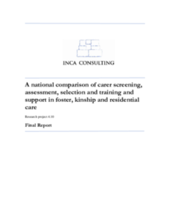Displaying 291 - 300 of 576
This study from the the Special Issue on Kinship Care of the Child Welfare Journal uses nationally representative survey data to describe differences in characteristics, adverse family experiences, and child well-being among children in kinship care with varying levels of involvement with the child welfare system in the US.
This two-part special issue of the Child Welfare Journal focuses on children in kinship care—those who are being raised by grandparents, aunts and uncles, older siblings, and non-related extended family members—to bring attention to this less visible area of public child welfare, featuring policy-based and empirical research on kinship families.
This study from the Special Issue on Kinship Care of the Child Welfare Journal examined the impact of a kinship supports intervention implemented in 16 children services agencies in the US.
The purpose of this article is to provide a summary of the published research addressing the challenges and strengths of Latino grandparents raising grandchildren in the United States.
In June 2015, the Australian Royal Commission into Institutional Responses to Child Sexual Abuse conducted public hearings in relation to out‑of‑home care (OOHC) and allegations of child sexual abuse occurring in OOHC settings (Case Study 24). In December 2015, the Royal Commission commissioned this national research report.
This country fact sheet highlights the care reforms that Spain has instituted over the past few years. This sheet also provides short facts and the latest developments on children in alternative care in Spain.
The aim of this guide is to enable practitioners to support children affected by a family member’s offending within a whole family approach.
The attached study compared the care environments of family-based care and institutional care to determine if care environment contributed to differences in sexual behavior and/or sexual exploitation of orphaned and separated adolescents.
This Article argues that Alaska should adopt a threestep approach to achieve better outcomes based on the American Bar Association’s model licensing standards, which are narrowly tailored to evaluate whether a child should be placed with a relative.
This study commissioned by the Ministry of Social Affairs, Veterans and Youth Rehabilitation of the Kingdom of Cambodia and UNICEF Cambodia sheds light on how different forms of alternative care are being used in the community.






